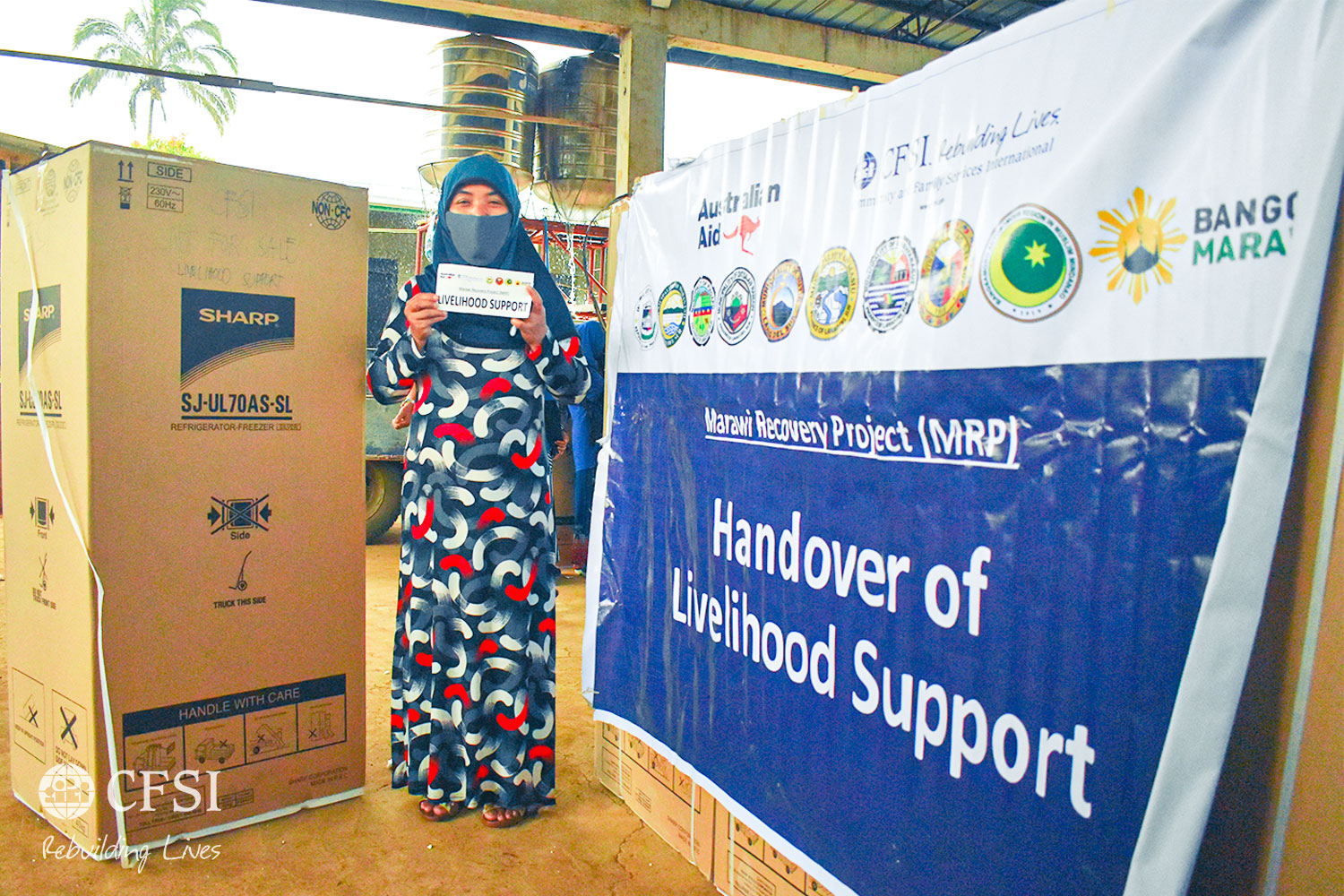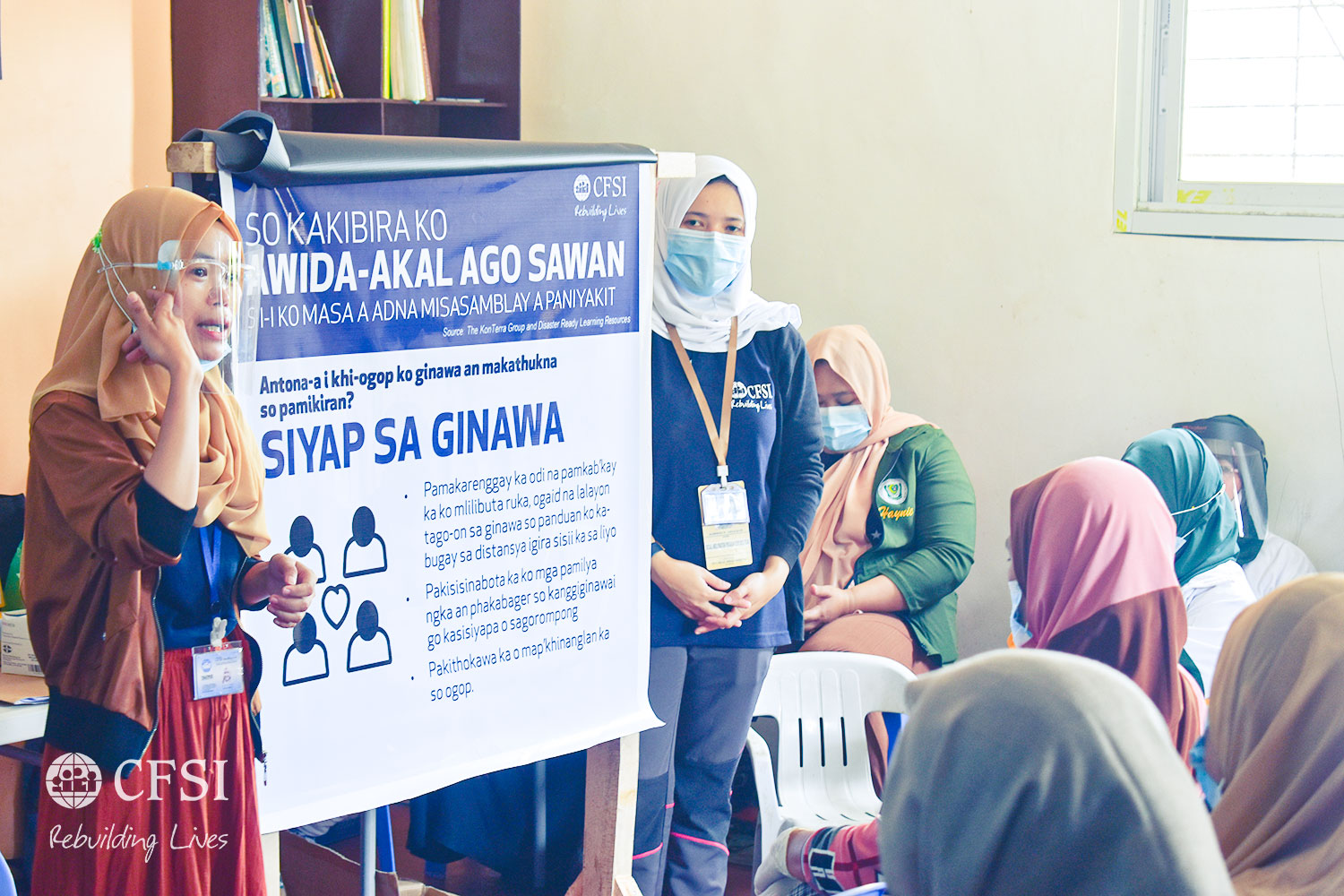The story was originally published by Marawi Aken, a community-initiated newspaper by and for the people of Marawi City and Lanao del Sur. The article can be found on page six of the publication.
Just when the internally displaced persons (IDPs) are still on their way to rebuilding their lives from the displacement and losses when Marawi was struck by armed conflict in 2017, the COVID-19 pandemic ravaged their livelihood and affected their well-being.
Jalima, an internally displaced person (IDP) living in Lakeview Boganga Transitory Shelter, has just been recovering from what she lost in 2017. Her family was given a sidecar livelihood support by the humanitarian Community and Family Services International (CFSI) through the Marawi Recovery Project (MRP) and was able to open her own sari-sari store out of the earnings from taking passengers.
When the pandemic hit the City in 2020, the store her family worked hard to have had to close down.
Mokie, an MRP project participant from the Municipality of Pantar, also felt the impact of the quarantine measures in their household. She was given a sari-sari store livelihood support, but with the loss of other means to gain income during the pandemic, they had no choice but to eat what they were supposed to be selling.

“Because my husband had to stop working, we had to start consuming the sari-sari store’s merchandise to sustain our needs,” Mokie shared.
Cayamona, another project participant, received a lamination and printing set from the MRP and so opened a printing shop near a school.
“When the pandemic happened, schools closed and classes have become modular or online. No one is requesting for lamination and printing jobs from us anymore,” she shared.
She started selling plants and seedlings to squeeze out some income for their household needs, but even selling them was also difficult when no one would go out of their house to buy her products.
Isnairah from Papandayan Caniogan in Marawi City used to sew and sell religious clothing and bedsheets using the sewing machine she received from MRP. She peddled them on the streets or visit houses to sell her products.
During the first few months of the pandemic, she stopped selling because of movement limitations imposed in the City.
“Now, I can barely earn about Php500 in a week,” she shared.
The work of garbage scavenging in Papandayan Caniogan was also greatly affected according to the residents. Before, garbage collectors are able to sell half a sack of empty plastic bottles for about Php2. Now, it was difficult to find a buyer for their goods because junk shops from Iligan City are unable to go to Marawi to buy their bottles.
Australia provided additional support through its partnership with CFSI through the Marawi COVID Recovery Project (MCRP). The project aims to help at least 4,000 families (around 20,000 people) to restart lost livelihood and recover from the impact of three major shocks – armed conflict, protracted displacement, and COVID-19.
The project, with a span of 30 months from January 2021 through June 2023, is supporting 1,000 select locally stranded individuals affected by the pandemic.
“Australia has been a strong supporter of development, peace, and stability in the southern Philippines for over 20 years. Our commitment to the people and the recovery of Marawi is steadfast, and this new project will assist the most vulnerable people in Mindanao who have been severely affected by prolonged displacement and by the socio-economic impacts of the pandemic,” said the Australian Ambassador to the Philippines Steven J. Robinson AO.
The MCRP is an expansion of the previous Australia-CFSI partnership, the MRP, that provided livelihood, protection, and psychosocial support for those displaced by the Marawi conflict.
“This project, which builds on previous partnership between the government, Australia, and CFSI, will provide critical support to vulnerable families and help them recover from the multiple challenges of displacement which has been exacerbated by the pandemic,” said Assistant Secretary Felix Castro Jr., Field Manager of the Task Force Bangon Marawi.
Since the start of the pandemic, MRP has launched various psychosocial support activities to support the well-being of the people of Marawi and Lanao del Sur through public health orientations in various barangays to inform people about COVID-19.
The Community Stakeholders Trainings enhanced the capacities of community leaders in promoting resilience among vulnerable populations which highlight, among others, the anxiety management and prevention of COVID-19, emerging and infectious diseases, child protection, gender-based violence, and referral pathways.
CFSI has also produced various information, education, and communication (IEC) materials in partnership with the barangays and the Rural Health Units in disseminating MRP’s campaigns against COVID-19 and its adverse mental health effects.

“This will be a big help. Because of the pandemic, many people lost their jobs, and we are hopeful that this project will help more families to recover their livelihoods,” said Marawi City Mayor Majul Gandamra.
Under its Partnerships for Recovery program, Australia has redirected its development cooperation to reinforce the Philippine response to the pandemic.
“Our partnership with CFSI will support families to recover from the impacts of COVID-19 and help foster inclusive and cohesive communities in the spirit of mateship and bayanihan,” said the Ambassador. #

